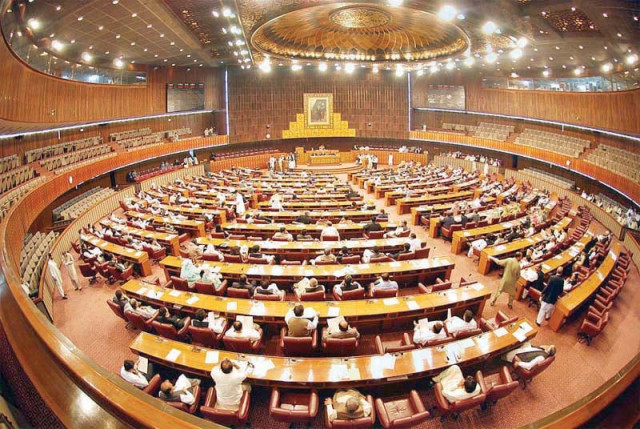Bill to end quota system presented in NA
Mover PTI’s Nusrat says first proviso of Article 27 shall be omitted as it is now ‘redundant clause’ in Constitution

A lawmaker from the ruling Pakistan Tehreek-e-Insaf (PTI) on Tuesday moved a bill seeking constitutional amendment to end the allocation of provincial quotas in federal services.
PTI’s Nusrat Wahid presented the bill seeking an amendment in Article 27 (safeguard against discrimination in services) of the Constitution, saying the first proviso of the article shall be omitted as it has completed its life and is present as “redundant clause” in the Constitution.
The panel with Amjad Ali Khan in the chair referred the bill to the committee concerned after Parliamentary Secretary for Law and Justice Maleeka Bokhari termed it a “sensitive and important bill” and did not oppose it.
The quota system had been in place since 1973 and the said proviso was first enacted for 20 years and later on amended and extended for 40 years from the date of enactment of the Constitution. The quotas for the provinces fixed for a total of 40 years ended in 2013.
On many occasions, amendment in the said article of the Constitution ensuring the representation of the underprivileged provinces has been discussed on the floor of both the houses. Mostly, the lawmakers sought amendment to extend the article’s life or restore the regional quota system in services. This, perhaps, is the first time that the lawmakers would discuss if it should be scrapped altogether.
“The Ministry of Law and Justice feels that it is an important and sensitive issue and it will have to be analysed in line with the judgments of the superior courts,” Bokhari said, adding that a detailed discussion was needed on the issue.
After the bill was presented, Bokhari while reiterating that the Article 27 gives representation of the underprivileged areas in federal services asked the chair of the panel to refer the matter to the committee concerned as different opinions from lawmakers would come on the subject and superior courts’ judgments on quota issue could also be examined during discussion at the committee stage.
In December 2018, Senator Mian Raza Rabbani had introduced a bill aiming to provide 20 years extension – making the total number of years to 60 – to the time period prescribed for quota in the proviso of Article 27 of the Constitution. The Senate committee had considered the bill from January 14, 2019, till February 13, 2020, and finally gave its opinion that the bill may not be passed from the Senate.
Interestingly, the secretary Ministry of Law and Justice had informed the Senate committee that the Supreme Court in its decision in 2016 interpreted Article 27 and declared that the expiry of time period for quota provided in the first proviso of the article does not need any further extension as the third proviso empowers parliament to enact a law to redress underrepresentation of any class or area in the services of Pakistan.
Article 27(1) states, “No citizen otherwise qualified for appointment in the service of Pakistan shall be discriminated against in respect of any such appointment on the ground only of race, religion, caste, sex, residence or place of birth.”
It adds: “Provided that, for a period not exceeding [forty] years from the commencing day, posts may be reserved for persons belonging to any class or area to secure their adequate representation in the service of Pakistan.
“Provided further that, in the interest of the said service, specified posts or services may be reserved for members of either sex if such posts or services entail the performance of duties and functions which cannot be adequately performed by members of the other sex.
“Provided also that under-representation of any class or area in the service of Pakistan may be redressed in such manner as may be determined by an Act of Majlis-e-Shoora (parliament).”


1724319076-0/Untitled-design-(5)1724319076-0-208x130.webp)
















COMMENTS
Comments are moderated and generally will be posted if they are on-topic and not abusive.
For more information, please see our Comments FAQ